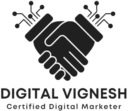1. Precise Targeting and Audience Segmentation
Digital marketing allows businesses to target their ideal customers with a high degree of precision. Tools like Google Ads, Facebook Ads, Instagram Ads, and data analytics platforms enable businesses to segment their audiences based on demographics, interests, behavior, location, and more. This ensures that marketing campaigns are reaching the most relevant and interested consumers rather than casting a wide, less focused net.
Example: An e-commerce business can target women aged 25-35 in urban areas with ads for trendy clothing sales, rather than relying on generalized advertising methods.
2. Cost-Effectiveness and Budget Optimization
Digital marketing is far more affordable compared to traditional marketing channels like print, TV, or radio. Campaigns can be scaled up or down depending on budget and goals, and tools allow businesses to analyze performance and adjust strategies in real-time. This leads to better utilization of marketing budgets and a higher return on investment (ROI).
Example: Small businesses or startups can use social media promotions instead of expensive billboards or newspaper ads to promote new offers.

3. Real-Time Performance Tracking & Data Analysis
Digital marketing platforms provide real-time insights into campaign performance using tools like Google Analytics, Facebook Insights, SEMrush, or HubSpot. These insights give businesses a clear understanding of metrics such as website traffic, engagement rates, conversion rates, and customer behavior. This data allows companies to make informed decisions quickly, optimizing strategies for success.
Example: If a business notices a decline in ad performance, they can adjust copy, visuals, or targeting in real time.
4. Flexibility & Adaptability
Digital marketing provides the flexibility to adapt to market trends, consumer preferences, and campaign outcomes. Businesses can test various campaigns, messaging styles, or platforms and pivot their strategies based on results. Unlike traditional campaigns that require weeks of preparation, digital strategies allow for quick responses and experimentation.
Example: A brand may adjust their strategy during a viral trend or change a promotion if they notice a shift in consumer response.

5. Global Reach and Scalability
One of the most significant competitive advantages of digital marketing is the ability to scale operations and connect with global markets. Digital platforms like search engines, social media, and email allow brands to connect with customers from anywhere in the world at any time.
Example: A local Indian brand can use social media advertising to target consumers in markets like Southeast Asia, the Middle East, or Europe.

6. Enhanced Customer Engagement & Relationship Building
Digital marketing creates opportunities for real-time interaction with customers through social media, email campaigns, and content marketing. Social media platforms, for example, allow brands to engage in conversations, answer customer queries, and strengthen brand trust by being accessible and relatable.
Example: A company that uses social media polls or user-generated content campaigns encourages customer participation and builds loyalty.
